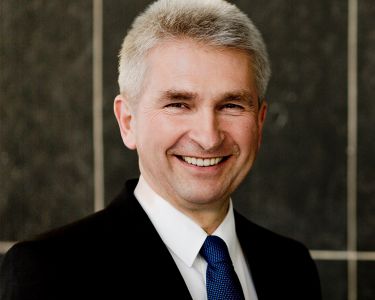
Preface to The Next Renaissance
Minister of Economic Affairs, Innovation, Digitalization and Energy of the State of North Rhine-Westphalia
Preface
Europe is undergoing a period of fundamental change. Whilst this comes with great challenges, we ought to recognise the enormous opportunity behind it. The top five issues of our time in all their complexity – globalisation, digital revolution, climate change, pandemics and natural disasters – are adding extra urgency to the question of where our European society is – or should be – heading. What do we want the future to look like? How are we proposing to get there? What type of innovation do we want to push forward for the benefit of our society? Those are questions of real concern.
Renaissance and its synonym, ‘rebirth’ are words that evoke inspiration. After all, the Renaissance period was marked by a variety of major innovations in art, science, technology, architecture and the trades. The ‘discovery of humanism’ was the game changer. Artists like Leonardo da Vinci, Artemisia Gentileschi or Albrecht Dürer are testimony to what really transformed things back then – the recognition of humans as subjects and as a creative and innovative force.
This wealth of ideas, of human creativity, needs to be called upon once more. We must use the potential of innovation in all its variety and simultaneity across economy and society and use it to get on top of the big challenges – digital transformation and the move towards climate neutrality by 2045. The key to innovation will always be the combination of creativity and technology.
The digital revolution has a huge impact on our proven concept of a democratic and liberal Europe. Future technologies such as artificial intelligence or blockchains hold enormous potential for innovation that we must exploit, but responsibly and in line with ethical values. Digital transformation of public services is the key to instilling trust in the work of government.
The transition to a climate-neutral economy and society is going to affect, if not upturn, all walks of life. We need renewable materials for the circular economy, new architectural and transport strategies, realignment of the energy system and forward-looking town planning philosophies.
There is a multitude of options for creative minds, innovative approaches and new business models. A major role is already set aside for the creative industries when it comes to realising the ‘European Renaissance’ envisaged here.
So, the EIT initiative to start a Knowledge and Innovation Community for the creative industries comes at the right time. North Rhine-Westphalia is backing the first-rate application that has been submitted for the launch of a creative industries KIC. The idea is that, over fifteen years, this agency will be spending some 500 million euros on innovation in the creative sector, designed to address the big challenges Europe is faced with. Such investment will be in line with the principles governing the Knowledge and Innovation Communities which the European Institute of Innovation and Technology (EIT) launched the first call for in 2008, banking on the interaction of education, research and innovation.
In these fast-moving times, the resourcefulness and innovation prowess of the creative industries are needed in Europe more than ever. The sector embodies crucial abilities, something that is more and more appreciated. The World Creativity and Innovation Day has been amongst the United Nations’ official theme days since 2018. In 2020, the World Economic Forum placed creativity at Number 3 of the ’TOP 10 Skills Needed’.
Europe needs to return to the heydays of ingenuity and innovation fervour. With a view to a European Renaissance of creativity, the ICE consortium is providing us with this publication which covers a wide spectrum of topics and will surely make for inspirational reading.
Prof. Dr. Andreas Pinkwart
Minister of Economic Affairs, Innovation, Digitalization and Energy of the State of North Rhine-Westphalia
Prof. Dr. Andreas Pinkwart, born in Seelscheid, Germany in 1960, after a banking apprenticeship he studied macroeconomics and business economics at the University of Münster and the University of Bonn from where he obtained his doctoral degree in 1991. He subsequently ran the office of Dr. Hermann Otto Solms, chairman of the FDP parliamentary group in the Bundestag, before continuing his academic career with professorships in Dusseldorf and Siegen. In 2002, he became a member of the German Bundestag and state chairman of the FDP (Free Democratic Party) in North Rhine-Westphalia. From 2005 until 2010, he was Minister for Innovation, Science, Research and Technology as well as Deputy Prime Minister in North Rhine-Westphalia. In 2011, he returned to the scientific sector. Until June 2017 Prof. Pinkwart was Dean of the HHL Leipzig Graduate School of Management and and ever since holds the Stiftungsfonds Deutsche Bank Chair for Innovation Management and Entrepreneurship. Since June 2017 he is Minister of Economics, Innovation, Digitalization and Energy of the State of North Rhine-Westphalia.
Picture © Ministry of Economic Affairs, Innovation, Digitalization & Energy, NRW

